Zanzibar’s captivating Stone Town offers visitors a unique opportunity to enjoy the island’s rich history and diverse cultural heritage. As a UNESCO World Heritage site, this historic coastal town showcases a remarkable blend of architectural styles, from ornate wooden doors to significant landmarks like the Anglican cathedral. Wandering its labyrinthine alleys, one can discover vibrant markets, engaging with the local cuisine, music, and art. Whether it’s exploring the legacy of the Old Slave Market or embarking on spice tours and traditional dhow boat rides, Stone Town promises an unforgettable experience that delves into the heart of Zanzibar’s enchanting identity.
Key Points
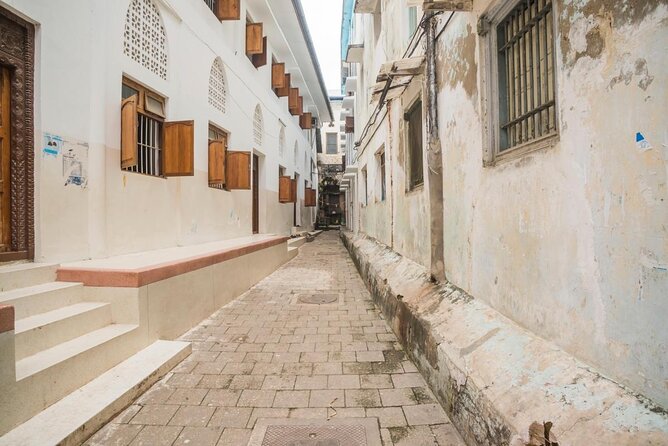
- Explore the rich cultural heritage and architectural gems of Stone Town, a UNESCO World Heritage Site with a diverse blend of African, Arab, Indian, and European influences.
- Enjoy the vibrant local markets, such as Darajani Market and Forodhani Gardens, to experience the sights, sounds, and aromas of Zanzibar’s culinary and cultural traditions.
- Visit historical sites like the Anglican cathedral, Jozani Forest, and the Old Slave Market to gain insights into the island’s complex past and its impact on the local community.
- Partake in unique experiences like traditional dhow boat rides, spice tours, and taarab music performances to deepen your understanding of Zanzibar’s rich maritime heritage and artistic expressions.
- Engage with the city’s thriving arts and crafts scene by exploring hidden art galleries and traditional workshops, and purchase iconic Zanzibar souvenirs such as intricate wood carvings and fabrics.
Exploring Stone Town’s History

Visitors to Stone Town, the historic heart of Zanzibar, can enjoy the city’s captivating past, which spans centuries of diverse cultural influences.
Once a major port for the lucrative spice and slave trades, Stone Town’s winding alleyways, ornate carved doors, and grand, turreted architecture reflect its storied history.
Travelers can explore ancient sultanate palaces, opulent mansions, and the bustling Forodhani Gardens, where old-world markets and dhow harbors evoke Zanzibar’s vibrant trading legacy.
From the imposing Anglican cathedral to the serene Jozani Forest, the city’s monuments and landmarks offer windows into its multilayered heritage as a cosmopolitan crossroads of African, Arab, Indian, and European cultures.
You can also read our reviews of more tours and experiences in Zanzibar.
Architecture of Stone Town
Stone Town’s captivating architecture reflects its diverse cultural heritage, with each corner revealing a new architectural gem. Ornately carved wooden doors, towering minarets, and grand, turreted buildings stand as testament to the city’s history as a cosmopolitan trading hub, blending African, Arab, Indian, and European influences.
The heart of Stone Town’s architectural charm lies in its winding alleyways and narrow streets, where buildings jostle for space, creating a labyrinthine maze. Many structures feature distinctive features like interior courtyards, shaded verandahs, and intricate latticework, showcasing the region’s unique artisanal traditions.
| Architectural Style | Key Features |
|---|---|
| Swahili | Carved wooden doors, central courtyards |
| Arab | Tall, slender minarets, flat rooftops |
| Indian | Ornate balconies, decorative facades |
| European | Neoclassical columns, symmetrical layouts |
Cultural Highlights of Stone Town
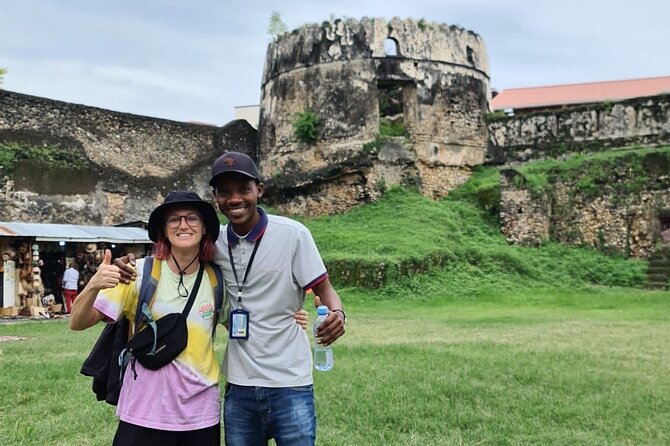
The cultural tapestry of Stone Town comes alive through its vibrant markets, timeless traditions, and historic landmarks that captivate visitors.
At the bustling Darajani Market, locals barter for spices, tropical fruits, and handcrafted wares, offering a glimpse into the daily life of the community.
Nearby, the Zanzibar Cathedral stands as a testament to the island’s multicultural heritage, blending Islamic and Christian influences.
Visitors can also explore the winding alleyways of Stone Town, discovering hidden art galleries and traditional workshops.
Plus, they can attend a performance of Taarab music, a unique local genre that fuses Arabic, Indian, and African styles.
To complete their experience, visitors can indulge in the rich, aromatic flavors of Zanzibari cuisine, from fragrant curries to delectable seafood dishes.
Forodhani Gardens and Seafood Market

At the heart of Stone Town lies the vibrant Forodhani Gardens, a lively seafood market that captivates visitors with its bustling energy and tantalizing aromas.
As the sun sets, the gardens transform into a bustling hub of activity, where local vendors set up stalls offering an array of fresh seafood, from succulent grilled prawns to sizzling octopus.
The air is thick with the scent of spices and the sounds of haggling and laughter. Visitors can wander through the market, sampling delectable dishes and seeing the rich culinary culture of Zanzibar.
Whether you’re a seafood enthusiast or simply seeking an authentic cultural experience, the Forodhani Gardens aren’t to be missed during your visit to Stone Town.
Visiting the Old Slave Market
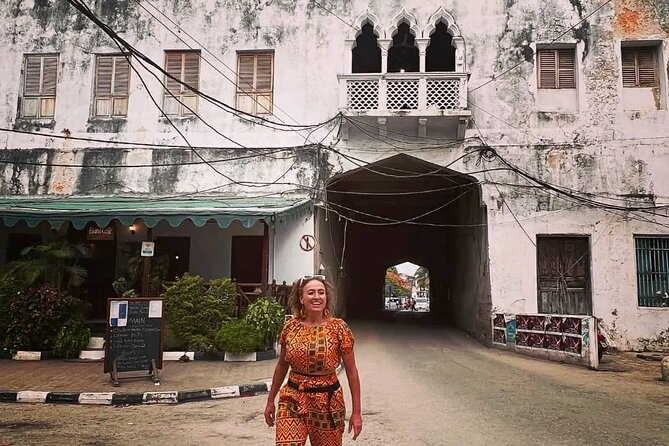
After exploring the vibrant Forodhani Gardens, visitors can venture to the somber yet historically significant Old Slave Market, a poignant reminder of Zanzibar’s complex past.
The market’s memorial site pays tribute to the thousands of Africans who were bought and sold into slavery through this very port. Visitors can:
-
Tour the Underground Railroad Museum, which chronicles the harrowing experiences of the enslaved.
-
Stand on the site where the slave market once stood, now marked by a simple monument.
-
Reflect on the lasting impact of this dark chapter and consider how to promote justice and human dignity.
This powerful experience offers important historical context and an opportunity for deeper understanding.
Spice Tours and Plantations
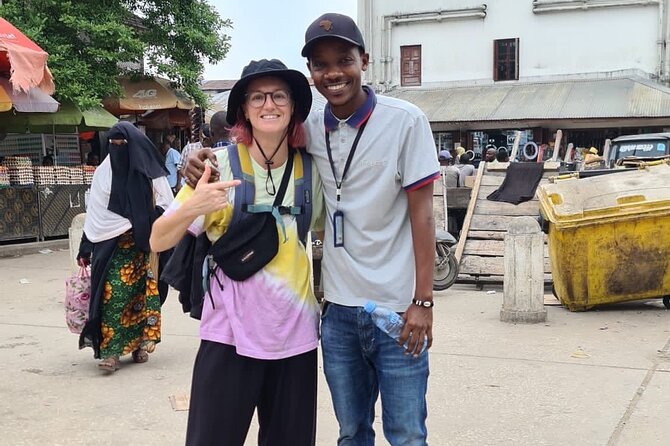
Spice plantations offer visitors a unique opportunity to enjoy Zanzibar’s vibrant culinary heritage, where the air is infused with the fragrant aromas of cloves, cinnamon, and cardamom. Guests can explore lush, verdant landscapes and learn about the intricate process of spice cultivation, from planting and harvesting to drying and processing. A guided spice tour provides insights into the history and significance of these valuable crops, which have long been central to Zanzibar’s economy and culture. The experience culminates in a visit to a local spice market, where visitors can sample a variety of exotic spices and purchase fresh produce to take home.
| Spice | Description | Uses |
|---|---|---|
| Cloves | The dried flower buds of the Syzygium aromaticum tree | Culinary flavoring, baking, marinades, and traditional medicine |
| Cinnamon | The inner bark of several Cinnamomum tree species | Baking, curries, beverages, and perfumes |
| Cardamom | The seed pods of several Elettaria and Amomum plant species | Curries, baked goods, teas, and traditional medicine |
| Nutmeg | The seed kernel or the ground spice of several Myristica trees | Baking, sauces, beverages, and traditional medicine |
| Black Pepper | The dried fruit of the Piper nigrum vine | Seasoning, marinades, and pickling |
Traditional Dhow Boat Rides
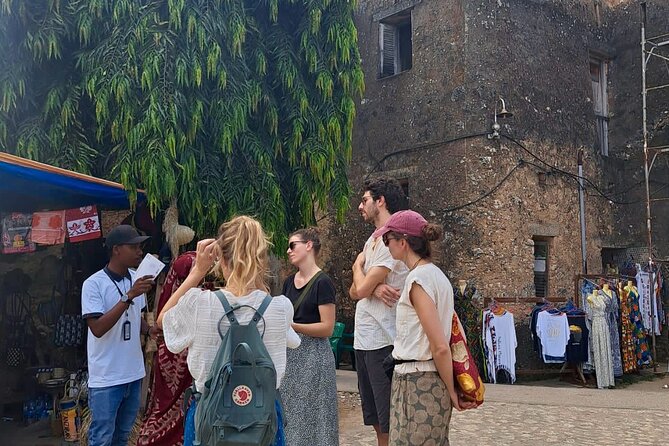
Visitors to Zanzibar can’t miss the opportunity to experience traditional dhow boat rides along the island’s picturesque coastline, offering a serene and authentic glimpse into the region’s rich maritime heritage.
These handcrafted wooden vessels, known as dhows, have been used for centuries by local fishermen and traders, and taking a leisurely cruise aboard one is a truly enchanting experience.
Some of the key highlights include:
-
Gliding along the tranquil waters, taking in the stunning views of Stone Town’s historic skyline and the surrounding islands.
-
Gaining insight into the traditional boat-building techniques and the importance of dhows in Zanzibar’s cultural identity.
-
Enjoying a peaceful moment of respite from the bustling streets, while immersing oneself in the island’s timeless nautical traditions.
Shopping in Stone Town
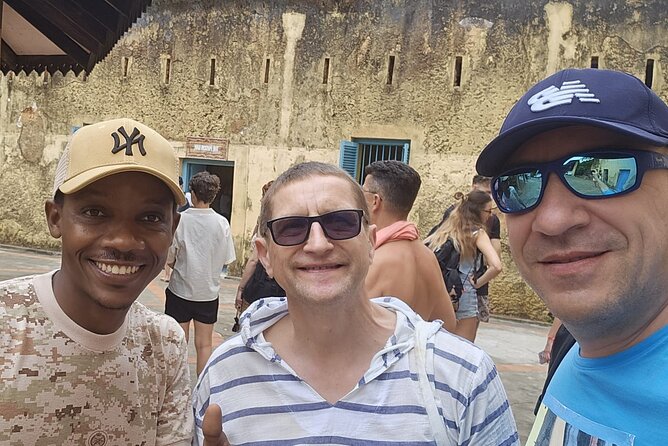
Exploring the vibrant markets and winding alleyways of Stone Town offers visitors a captivating glimpse into the island’s rich artisanal heritage, where skilled craftspeople showcase an array of handmade treasures.
From the bustling Forodhani Gardens to the maze-like Darajani Market, shoppers can enjoy a sensory delight, haggling for unique spices, intricate wood carvings, vibrant fabrics, and exquisite jewelry.
The iconic Zanzibar doors, adorned with ornate carvings and brass studs, are a popular souvenir.
Visitors can also browse the stalls of the Jua Kali market, where local artisans sell their handcrafted wares, ranging from paintings and batiks to handwoven baskets and leatherwork.
Shopping in Stone Town is an unforgettable experience that celebrates Zanzibar’s rich cultural tapestry.
Frequently Asked Questions
What Is the Dress Code for the Tour?
The tour does not have a strict dress code, but visitors are encouraged to dress comfortably and modestly, as they’ll be exploring historic sites. Casual, lightweight clothing that covers shoulders and knees is recommended for the walking tour.
Can I Bring My Camera on the Tour?
Yes, visitors can bring their cameras on the tour. The tour allows participants to capture the historical sights and cultural experiences of Stone Town. Photography is encouraged to document the memorable moments of the guided excursion.
How Much Local Currency Should I Bring?
The tour guide recommends bringing enough local currency, Tanzanian shillings, to cover any additional food, drinks, or souvenirs you may want to purchase during the tour of Stone Town. An approximate range of 20,000-50,000 Tanzanian shillings should be sufficient.
Is There a Restroom Available During the Tour?
Yes, there are restroom facilities available during the Stone Town tour. Participants can use the restrooms at the meeting point in Forodhani Gardens or at other stops along the tour route, as needed.
Are There Any Age Restrictions for the Tour?
There are no age restrictions for this tour. The tour is suitable for travelers of all ages, though it’s not recommended for those with certain medical conditions that may make the walking difficult. Families and children are welcome to participate.
The Sum Up
Visiting Stone Town offers a captivating journey through Zanzibar’s rich history and diverse culture.
Wandering its labyrinthine alleys, one can discover vibrant markets, ornate wooden doors, and significant landmarks that highlight the town’s unique heritage.
From engaging with local cuisine and art to exploring the Old Slave Market and taking traditional dhow boat rides, Stone Town provides an immersive experience that showcases the blending of African, Arab, Indian, and European influences.
More Tour Reviews in Zanzibar
Not for you? Here's more things to do in Zanzibar we have recnetly reviewed
- 3 Best Guided Tours In Zanzibar
- 4 Best Cruises And Boat Tours In Zanzibar
- 2 Best Dining Experiences In Zanzibar
- 8 Best Full-Day Tours In Zanzibar
- 3 Best Food Tours In Zanzibar
- 3 Best Private Car With Driver Services In Zanzibar
- Jozani Forest Tour
- Fair Tourism In Paje
- Zanzibar Spice Farm Tour & Exotic Fruit Lunch
- Jozani Forest Tour
- Private Transfer From Abeid Amani Karume Airport to Zanzibar
- Zanzibar Tumbatu Island Cultural Experience
